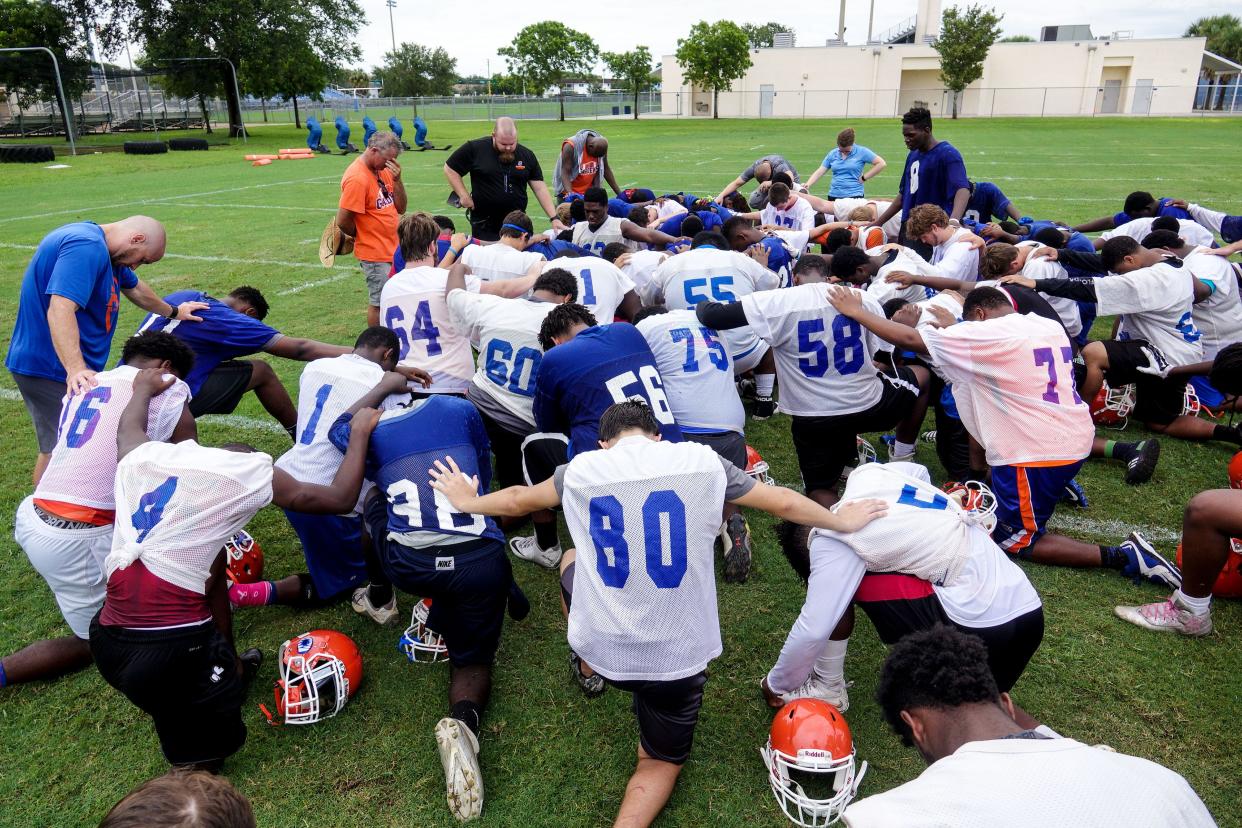Burned: Florida lawmakers cast aside efforts to protect outdoor workers from heat
Seven summers ago, a high school football player in Florida died of heatstroke suffered during an outdoor practice.
Zachary Martin, age 16, was overcome at a July practice of his Riverdale High School football team in Lee County.
Three years following the teen’s death, the school district settled a lawsuit filed by his family for $950,000. That same year, the Florida Legislature passed the Zachary Martin Act, a piece of legislation designed to prevent future heat-related deaths of high school athletes in the state.

The act requires every public school in the Florida High School Athletic Association to have an emergency action plan for heat-related illnesses during practices and games.
This includes onsite cold water immersion tubs, establishment of cooling zones, hydration guidelines including electrolytes, and an automated external defibrillator (AED) at each practice or game with a school employee trained in its use.
A quick and knowledgeable response to heat illness is frequently the difference between life and death.
So, coaches and volunteers are required to be educated on the signs of heat stress, and every student participating in the outdoor activities has to first pass an annual medical evaluation.
Now, compare the reaction of Zachary Martin’s heat-related death to the death of another Floridian, Efrain Lopez Garcia, a 30-year-old farmworker in Homestead.
Lopez Garcia was overcome by the heat from working in the fields in July of last year during a record hot spell.
He was the second South Florida farmworker to be felled by heat exposure that month, and it sparked protests outside the Miami-Dade County Government building.

“We want employers to know to educate their employees about how to take care of themselves. Basic needs: water, shade, breaks,” Yvette Cruz, of the Farm Workers Association of Florida, told WPLG-Channel 10 news.
The protest led the Miami-Dade County Commission to pass a preliminary measure that required agriculture and construction employers to give their workers 10-minute water breaks after every two hours of outdoor work, and to offer them a shaded area to cool down during the workday.
The county lawmakers also required workers and their bosses to receive safety instruction on heat exposure risks. And to enforce the new regulations, a county office would be created, and non-complying employers could face $2,000 fines per infraction.
“It will be the first such law in Florida, and it will be the strongest such law if it passes as is in the entire nation,” Miami-Dade County Mayor Daniella Levine said at the time.
Here’s where the stories of the 16-year-old white football player and 30-year-old Guatemalan farmworker diverge.
The Florida Legislature stepped up to recognize the dangers of high school football in Florida’s heat but sabotaged the efforts of Miami-Dade to protect its farmworkers under that same sun.
While Miami-Dade delayed enacting its heat safety law, state lawmakers stepped in to kill it from afar by advancing a new bill that would make the Miami worker-protection law illegal.
The Republican-led legislature has been advancing a bill this session that gives state legislators, not county governments, sole authority to enact heat-safety regulations for workers in Florida.
And the lawmakers advancing the bill have made it clear that they don’t want any new worker heat-related protections.
Just trust the employers, they say. Employers have nothing but goodwill for their workers.
“A business owner knows what’s best for his employees,” said Florida Sen. Jay Trumbull, R-Panama City.
Trumbull runs an air-conditioning business, and is the sponsor of the bill that preempts county governments from enacting heat-protection laws for workers.
“Everybody understands that there are certain limits and you can’t push a human being any farther than they’ll go,” Trumbull said. “And the reality is, you got to have some give and take.”
The effort to kill Miami’s worker-protection measure is backed by the state’s big business interests, including the Associated Builders and Contractors of Florida, who say that it would be too confusing for employers to follow heat safety rules that vary by county.
“Having a patchwork of regulations around heat issues is not the way to go,” Florida Chamber of Commerce executive Carolyn Johnson said during a hearing in the Senate’s Committee on Commerce and Tourism.
Leave it to employers, said Adam Basford, the governmental affairs vice president with the Associated Industries of Florida.
“When it comes to workplace safety, employers care a whole lot,” Basford told lawmakers.
But during that same meeting, the Rev. Russell Meyer, the executive director of Florida Council of Churches, told lawmakers about the heat-related death of a worker renovating one of his churches in Jacksonville.
“We did not know the warning signs,” Meyer said. “His partner who hired him did not see the warning signs of his health condition, and if we’d seen that, he’d be alive today.”
“So, it’s not simply a matter of goodwill,” Meyer said.
More: Florida lawmakers take bullet-proof cover from the guns they encourage
More: Florida lawmakers more attuned to dangers of strip clubs than assault rifles
Jackson Oberlink, a lobbyist for Florida Rising, a voting rights and social justice group, said that lawmakers are putting corporate interests over the lives of workers, while destroying the rights of local governments to protect their residents.
“This bill is an outright assault on working families in the state and a reckless power grab by corporate special interests that completely disregard the needs and protections of our workforce,” Basford told the lawmakers.
“This bill shows a blatant disregard for the struggles faced by the backbone of our society, working Floridians,” he said. “It’s a slap in the face of democracy and local freedoms.”
It’s too bad that Florida lawmakers aren’t required to vote on all heat-protection legislation during unshaded, day-long outdoor sessions in August.
And maybe if Florida’s outdoor laborers dressed as high school football players, their lives would be valued more.
Frank Cerabino is a news columnist with The Palm Beach Post, part of the Gannett Newspapers chain.
This article originally appeared on Palm Beach Post: State lawmakers stymie heat protection legislation for outdoor workers
